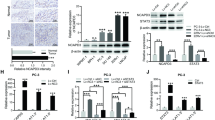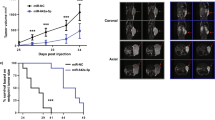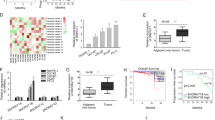Abstract
Minichromosome complex maintenance component 7 (MCM7) is a critical component of DNA replication licensing. Amplification and overexpression of MCM7 leads to high rate of prostate cancer metastasis. Recent studies indicate that MCM7 genome encodes a putative ‘super-oncogene’ cluster including MCM7 oncogene and a miRNA cluster that knocks down the expression of several critical tumor-suppressor genes. In this study, we constructed a vector that constitutively expresses small interference RNA (siRNA) specific for MCM7. Introduction of this vector into prostate cancer cell lines PC3 or Du145 decreases the expression of MCM7 by 80%. The vector inhibits DNA synthesis and generates growth arrest of these cancer cells. Severe combined immunodeficient mice were xenografted PC3 or Du145 tumors, and subsequently treated with this vector through tail vein injection with polyethylenimine. The animals had dramatically smaller tumor volume, less metastasis and better survival rate in comparison with the controls. As a result, intervention of MCM7 expression using siRNA approach may hold the promise for treating androgen refractory prostate cancer.
This is a preview of subscription content, access via your institution
Access options
Subscribe to this journal
Receive 12 print issues and online access
$259.00 per year
only $21.58 per issue
Buy this article
- Purchase on Springer Link
- Instant access to full article PDF
Prices may be subject to local taxes which are calculated during checkout





Similar content being viewed by others
References
Blow JJ, Hodgson B . Replication licensing--defining the proliferative state? Trends Cell Biol 2002; 12: 72–78.
You Z, Komamura Y, Ishimi Y . Biochemical analysis of the intrinsic Mcm4-Mcm6-mcm7 DNA helicase activity. Mol Cell Biol 1999; 19: 8003–8015.
Levesque MH, El-Alfy M, Berger L, Labrie F, Labrie C . Evaluation of AIbZIP and Cdc47 as markers for human prostatic diseases. Urology 2007; 69: 196–201.
Ren B, Yu G, Tseng GC, Cieply K, Gavel T, Nelson J et al. MCM7 amplification and overexpression are associated with prostate cancer progression. Oncogene 2006; 25: 1090–1098.
Honeycutt KA, Chen Z, Koster MI, Miers M, Nuchtern J, Hicks J et al. Deregulated minichromosomal maintenance protein MCM7 contributes to oncogene driven tumorigenesis. Oncogene 2006; 25: 4027–4032.
Li SS, Xue WC, Khoo US, Ngan HY, Chan KY, Tam IY et al. Replicative MCM7 protein as a proliferation marker in endometrial carcinoma: a tissue microarray and clinicopathological analysis. Histopathology 2005; 46: 307–313.
Gambichler T, Shtern M, Rotterdam S, Bechara FG, Stucker M, Altmeyer P et al. Minichromosome maintenance proteins are useful adjuncts to differentiate between benign and malignant melanocytic skin lesions. J Am Acad Dermatol 2009; 60: 808–813.
Kan T, Sato F, Ito T, Matsumura N, David S, Cheng Y et al. The miR-106b-25 polycistron, activated by genomic amplification, functions as an oncogene by suppressing p21 and Bim. Gastroenterology 2009; 136: 1689–1700.
Nishihara K, Shomori K, Fujioka S, Tokuyasu N, Inaba A, Osaki M et al. Minichromosome maintenance protein 7 in colorectal cancer implication of prognostic significance. Int J Oncol 2008; 33: 245–251.
Feng CJ, Li HJ, Li JN, Lu YJ, Liao GQ . Expression of Mcm7 and Cdc6 in oral squamous cell carcinoma and precancerous lesions. Anticancer Res 2008; 28: 3763–3769.
Facoetti A, Ranza E, Benericetti E, Ceroni M, Tedeschi F, Nano R . Minichromosome maintenance protein 7: a reliable tool for glioblastoma proliferation index. Anticancer Res 2006; 26: 1071–1075.
Kebebew E, Peng M, Reiff E, Duh QY, Clark OH, McMillan A . Diagnostic and prognostic value of cell-cycle regulatory genes in malignant thyroid neoplasms. World J Surg 2006; 30: 767–774.
Ivanovska I, Ball AS, Diaz RL, Magnus JF, Kibukawa M, Schelter JM et al. MicroRNAs in the miR-106b family regulate p21/CDKN1A and promote cell cycle progression. Mol Cell Biol 2008; 28: 2167–2174.
Ventura A, Young AG, Winslow MM, Lintault L, Meissner A, Erkeland SJ et al. Targeted deletion reveals essential and overlapping functions of the miR-17 through 92 family of miRNA clusters. Cell 2008; 132: 875–886.
Petrocca F, Visone R, Onelli MR, Shah MH, Nicoloso MS, de Martino I et al. E2F1-regulated microRNAs impair TGFbeta-dependent cell-cycle arrest and apoptosis in gastric cancer. Cancer Cell 2008; 13: 272–286.
Shi YK, Yu YP, Zhu ZH, Han YC, Ren B, Nelson JB et al. MCM7 interacts with androgen receptor. Am J Pathol 2008; 173: 1758–1767.
Padmanabhan V, Callas P, Philips G, Trainer TD, Beatty BG . DNA replication regulation protein Mcm7 as a marker of proliferation in prostate cancer. J Clin Pathol 2004; 57: 1057–1062.
Brake T, Connor JP, Petereit DG, Lambert PF . Comparative analysis of cervical cancer in women and in a human papillomavirus-transgenic mouse model: identification of minichromosome maintenance protein 7 as an informative biomarker for human cervical cancer. Cancer Res 2003; 63: 8173–8180.
Sikand K, Slane SD, Shukla GC . Intrinsic expression of host genes and intronic miRNAs in prostate carcinoma cells. Cancer Cell Int 2009; 9: 21.
Ambs S, Prueitt RL, Yi M, Hudson RS, Howe TM, Petrocca F et al. Genomic profiling of microRNA and messenger RNA reveals deregulated microRNA expression in prostate cancer. Cancer Res 2008; 68: 6162–6170.
Acknowledgements
This work was supported by grants from National Cancer Institute (RO1 CA098249 to JHL), Department of Defense (W81 XWH-09-1-0376 to JHL), and American Cancer Society (RSG-08-137-01-CNE to YPY).
Author information
Authors and Affiliations
Corresponding author
Ethics declarations
Competing interests
The authors declare no conflict of interest.
Rights and permissions
About this article
Cite this article
Shi, YK., Yu, Y., Tseng, G. et al. Inhibition of prostate cancer growth and metastasis using small interference RNA specific for minichromosome complex maintenance component 7. Cancer Gene Ther 17, 694–699 (2010). https://doi.org/10.1038/cgt.2010.25
Received:
Revised:
Accepted:
Published:
Issue Date:
DOI: https://doi.org/10.1038/cgt.2010.25
Keywords
This article is cited by
-
Targeting genomic rearrangements in tumor cells through Cas9-mediated insertion of a suicide gene
Nature Biotechnology (2017)
-
Metastasis associated genomic aberrations in stage II rectal cancer
Genes & Genomics (2016)
-
The miR-106b∼25 cluster promotes bypass of doxorubicin-induced senescence and increase in motility and invasion by targeting the E-cadherin transcriptional activator EP300
Cell Death & Differentiation (2014)
-
Exploring the role of miRNAs in renal cell carcinoma progression and metastasis through bioinformatic and experimental analyses
Tumor Biology (2012)



